Entrepreneurship and Strategic Management Research
VerifiedAdded on 2020/10/05
|16
|4735
|463
AI Summary
This assignment involves a comprehensive review of entrepreneurship research papers, covering topics such as strategic entrepreneurship, social entrepreneurship, corporate entrepreneurship, and entrepreneurship education. It also includes references to specific studies, such as the impact of entrepreneurship education in higher education and the climate for entrepreneurship in European countries in transition. The summary provides details on the various research papers and studies included in the assignment, making it a valuable resource for students and researchers in the field of entrepreneurship.
Contribute Materials
Your contribution can guide someone’s learning journey. Share your
documents today.

ENTREPRENEURSHIP
AND SMALL BUSINESS
MANAGEMENT
AND SMALL BUSINESS
MANAGEMENT
Secure Best Marks with AI Grader
Need help grading? Try our AI Grader for instant feedback on your assignments.
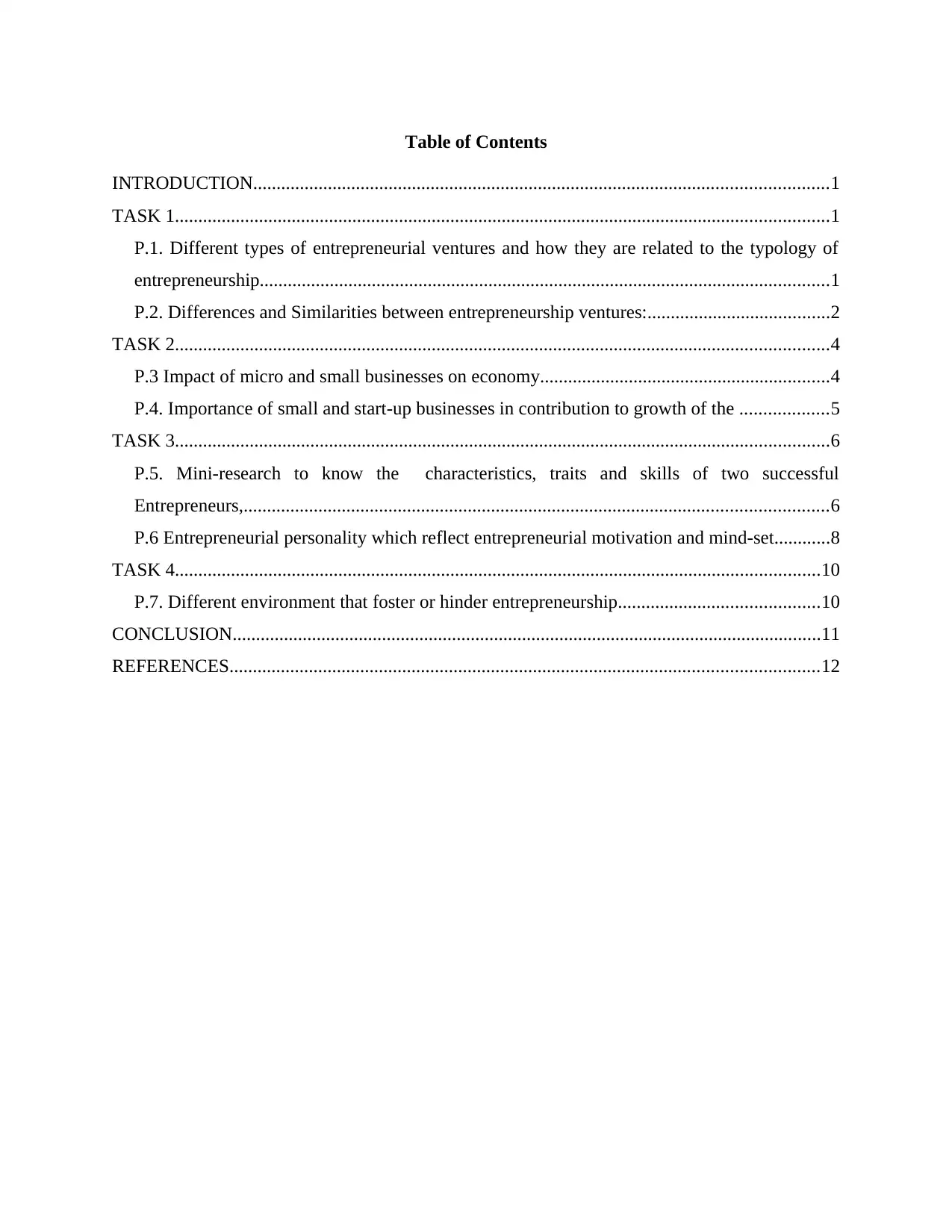
Table of Contents
INTRODUCTION...........................................................................................................................1
TASK 1............................................................................................................................................1
P.1. Different types of entrepreneurial ventures and how they are related to the typology of
entrepreneurship..........................................................................................................................1
P.2. Differences and Similarities between entrepreneurship ventures:.......................................2
TASK 2............................................................................................................................................4
P.3 Impact of micro and small businesses on economy..............................................................4
P.4. Importance of small and start-up businesses in contribution to growth of the ...................5
TASK 3............................................................................................................................................6
P.5. Mini-research to know the characteristics, traits and skills of two successful
Entrepreneurs,.............................................................................................................................6
P.6 Entrepreneurial personality which reflect entrepreneurial motivation and mind-set............8
TASK 4..........................................................................................................................................10
P.7. Different environment that foster or hinder entrepreneurship...........................................10
CONCLUSION..............................................................................................................................11
REFERENCES..............................................................................................................................12
INTRODUCTION...........................................................................................................................1
TASK 1............................................................................................................................................1
P.1. Different types of entrepreneurial ventures and how they are related to the typology of
entrepreneurship..........................................................................................................................1
P.2. Differences and Similarities between entrepreneurship ventures:.......................................2
TASK 2............................................................................................................................................4
P.3 Impact of micro and small businesses on economy..............................................................4
P.4. Importance of small and start-up businesses in contribution to growth of the ...................5
TASK 3............................................................................................................................................6
P.5. Mini-research to know the characteristics, traits and skills of two successful
Entrepreneurs,.............................................................................................................................6
P.6 Entrepreneurial personality which reflect entrepreneurial motivation and mind-set............8
TASK 4..........................................................................................................................................10
P.7. Different environment that foster or hinder entrepreneurship...........................................10
CONCLUSION..............................................................................................................................11
REFERENCES..............................................................................................................................12
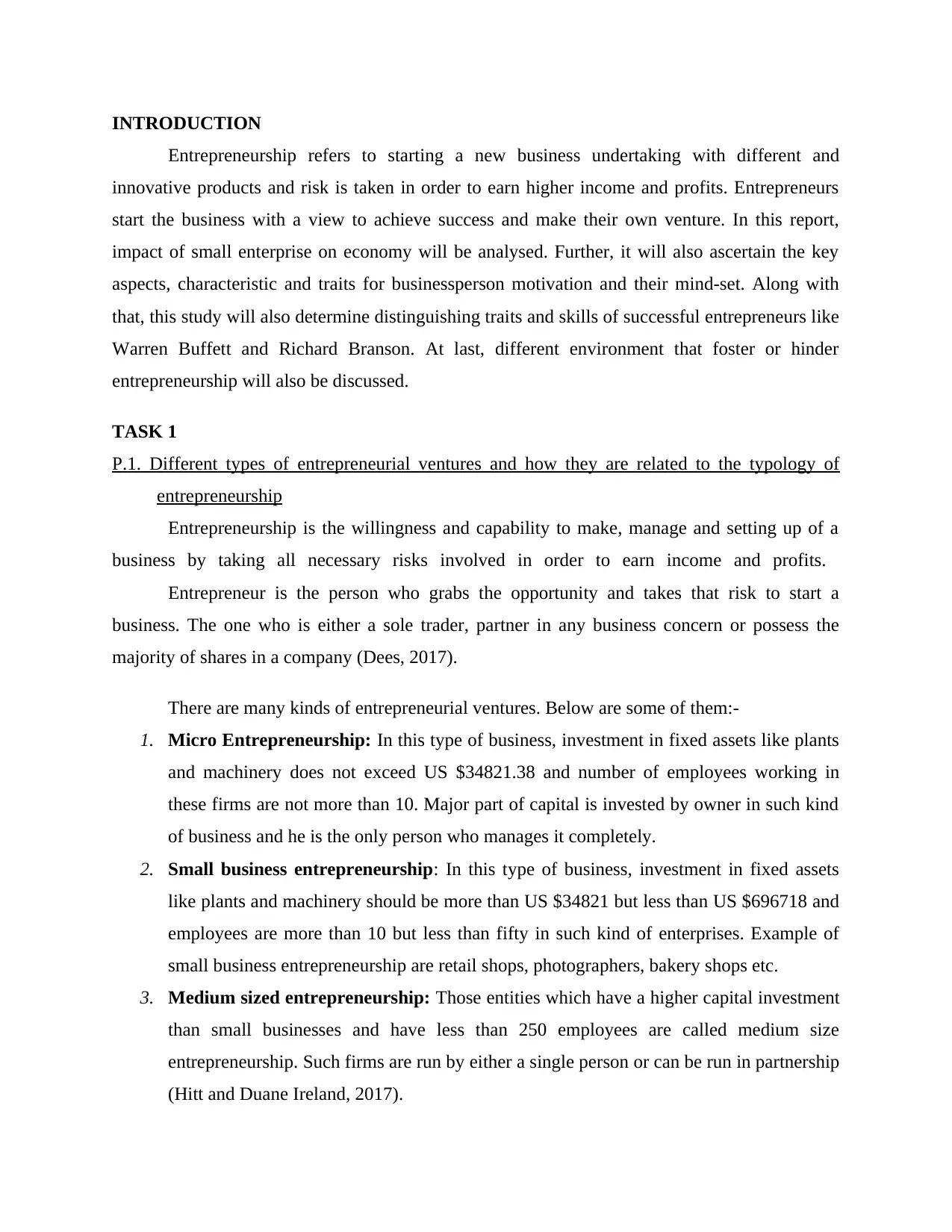
INTRODUCTION
Entrepreneurship refers to starting a new business undertaking with different and
innovative products and risk is taken in order to earn higher income and profits. Entrepreneurs
start the business with a view to achieve success and make their own venture. In this report,
impact of small enterprise on economy will be analysed. Further, it will also ascertain the key
aspects, characteristic and traits for businessperson motivation and their mind-set. Along with
that, this study will also determine distinguishing traits and skills of successful entrepreneurs like
Warren Buffett and Richard Branson. At last, different environment that foster or hinder
entrepreneurship will also be discussed.
TASK 1
P.1. Different types of entrepreneurial ventures and how they are related to the typology of
entrepreneurship
Entrepreneurship is the willingness and capability to make, manage and setting up of a
business by taking all necessary risks involved in order to earn income and profits.
Entrepreneur is the person who grabs the opportunity and takes that risk to start a
business. The one who is either a sole trader, partner in any business concern or possess the
majority of shares in a company (Dees, 2017).
There are many kinds of entrepreneurial ventures. Below are some of them:-
1. Micro Entrepreneurship: In this type of business, investment in fixed assets like plants
and machinery does not exceed US $34821.38 and number of employees working in
these firms are not more than 10. Major part of capital is invested by owner in such kind
of business and he is the only person who manages it completely.
2. Small business entrepreneurship: In this type of business, investment in fixed assets
like plants and machinery should be more than US $34821 but less than US $696718 and
employees are more than 10 but less than fifty in such kind of enterprises. Example of
small business entrepreneurship are retail shops, photographers, bakery shops etc.
3. Medium sized entrepreneurship: Those entities which have a higher capital investment
than small businesses and have less than 250 employees are called medium size
entrepreneurship. Such firms are run by either a single person or can be run in partnership
(Hitt and Duane Ireland, 2017).
Entrepreneurship refers to starting a new business undertaking with different and
innovative products and risk is taken in order to earn higher income and profits. Entrepreneurs
start the business with a view to achieve success and make their own venture. In this report,
impact of small enterprise on economy will be analysed. Further, it will also ascertain the key
aspects, characteristic and traits for businessperson motivation and their mind-set. Along with
that, this study will also determine distinguishing traits and skills of successful entrepreneurs like
Warren Buffett and Richard Branson. At last, different environment that foster or hinder
entrepreneurship will also be discussed.
TASK 1
P.1. Different types of entrepreneurial ventures and how they are related to the typology of
entrepreneurship
Entrepreneurship is the willingness and capability to make, manage and setting up of a
business by taking all necessary risks involved in order to earn income and profits.
Entrepreneur is the person who grabs the opportunity and takes that risk to start a
business. The one who is either a sole trader, partner in any business concern or possess the
majority of shares in a company (Dees, 2017).
There are many kinds of entrepreneurial ventures. Below are some of them:-
1. Micro Entrepreneurship: In this type of business, investment in fixed assets like plants
and machinery does not exceed US $34821.38 and number of employees working in
these firms are not more than 10. Major part of capital is invested by owner in such kind
of business and he is the only person who manages it completely.
2. Small business entrepreneurship: In this type of business, investment in fixed assets
like plants and machinery should be more than US $34821 but less than US $696718 and
employees are more than 10 but less than fifty in such kind of enterprises. Example of
small business entrepreneurship are retail shops, photographers, bakery shops etc.
3. Medium sized entrepreneurship: Those entities which have a higher capital investment
than small businesses and have less than 250 employees are called medium size
entrepreneurship. Such firms are run by either a single person or can be run in partnership
(Hitt and Duane Ireland, 2017).
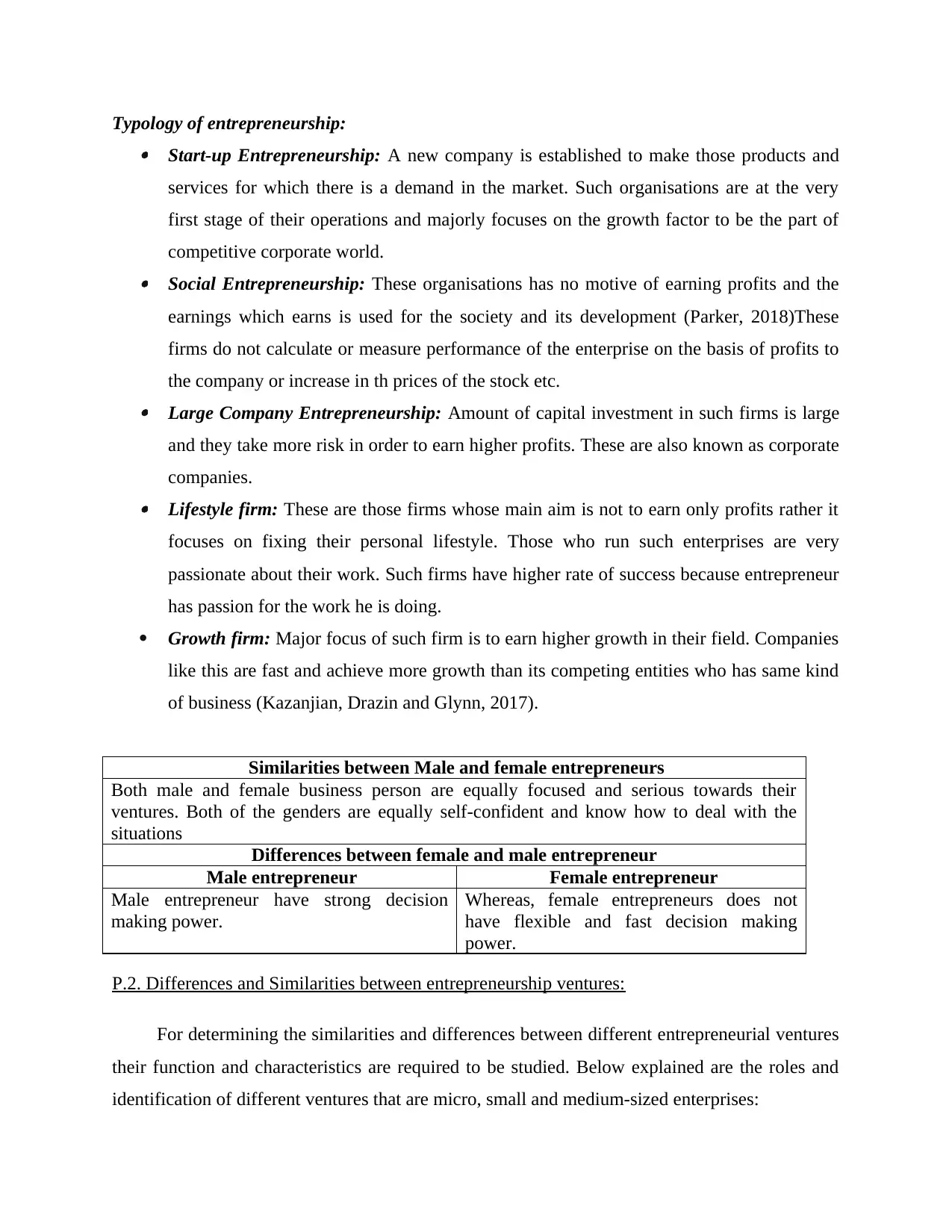
Typology of entrepreneurship: Start-up Entrepreneurship: A new company is established to make those products and
services for which there is a demand in the market. Such organisations are at the very
first stage of their operations and majorly focuses on the growth factor to be the part of
competitive corporate world. Social Entrepreneurship: These organisations has no motive of earning profits and the
earnings which earns is used for the society and its development (Parker, 2018)These
firms do not calculate or measure performance of the enterprise on the basis of profits to
the company or increase in th prices of the stock etc. Large Company Entrepreneurship: Amount of capital investment in such firms is large
and they take more risk in order to earn higher profits. These are also known as corporate
companies. Lifestyle firm: These are those firms whose main aim is not to earn only profits rather it
focuses on fixing their personal lifestyle. Those who run such enterprises are very
passionate about their work. Such firms have higher rate of success because entrepreneur
has passion for the work he is doing.
Growth firm: Major focus of such firm is to earn higher growth in their field. Companies
like this are fast and achieve more growth than its competing entities who has same kind
of business (Kazanjian, Drazin and Glynn, 2017).
Similarities between Male and female entrepreneurs
Both male and female business person are equally focused and serious towards their
ventures. Both of the genders are equally self-confident and know how to deal with the
situations
Differences between female and male entrepreneur
Male entrepreneur Female entrepreneur
Male entrepreneur have strong decision
making power.
Whereas, female entrepreneurs does not
have flexible and fast decision making
power.
P.2. Differences and Similarities between entrepreneurship ventures:
For determining the similarities and differences between different entrepreneurial ventures
their function and characteristics are required to be studied. Below explained are the roles and
identification of different ventures that are micro, small and medium-sized enterprises:
services for which there is a demand in the market. Such organisations are at the very
first stage of their operations and majorly focuses on the growth factor to be the part of
competitive corporate world. Social Entrepreneurship: These organisations has no motive of earning profits and the
earnings which earns is used for the society and its development (Parker, 2018)These
firms do not calculate or measure performance of the enterprise on the basis of profits to
the company or increase in th prices of the stock etc. Large Company Entrepreneurship: Amount of capital investment in such firms is large
and they take more risk in order to earn higher profits. These are also known as corporate
companies. Lifestyle firm: These are those firms whose main aim is not to earn only profits rather it
focuses on fixing their personal lifestyle. Those who run such enterprises are very
passionate about their work. Such firms have higher rate of success because entrepreneur
has passion for the work he is doing.
Growth firm: Major focus of such firm is to earn higher growth in their field. Companies
like this are fast and achieve more growth than its competing entities who has same kind
of business (Kazanjian, Drazin and Glynn, 2017).
Similarities between Male and female entrepreneurs
Both male and female business person are equally focused and serious towards their
ventures. Both of the genders are equally self-confident and know how to deal with the
situations
Differences between female and male entrepreneur
Male entrepreneur Female entrepreneur
Male entrepreneur have strong decision
making power.
Whereas, female entrepreneurs does not
have flexible and fast decision making
power.
P.2. Differences and Similarities between entrepreneurship ventures:
For determining the similarities and differences between different entrepreneurial ventures
their function and characteristics are required to be studied. Below explained are the roles and
identification of different ventures that are micro, small and medium-sized enterprises:
Secure Best Marks with AI Grader
Need help grading? Try our AI Grader for instant feedback on your assignments.
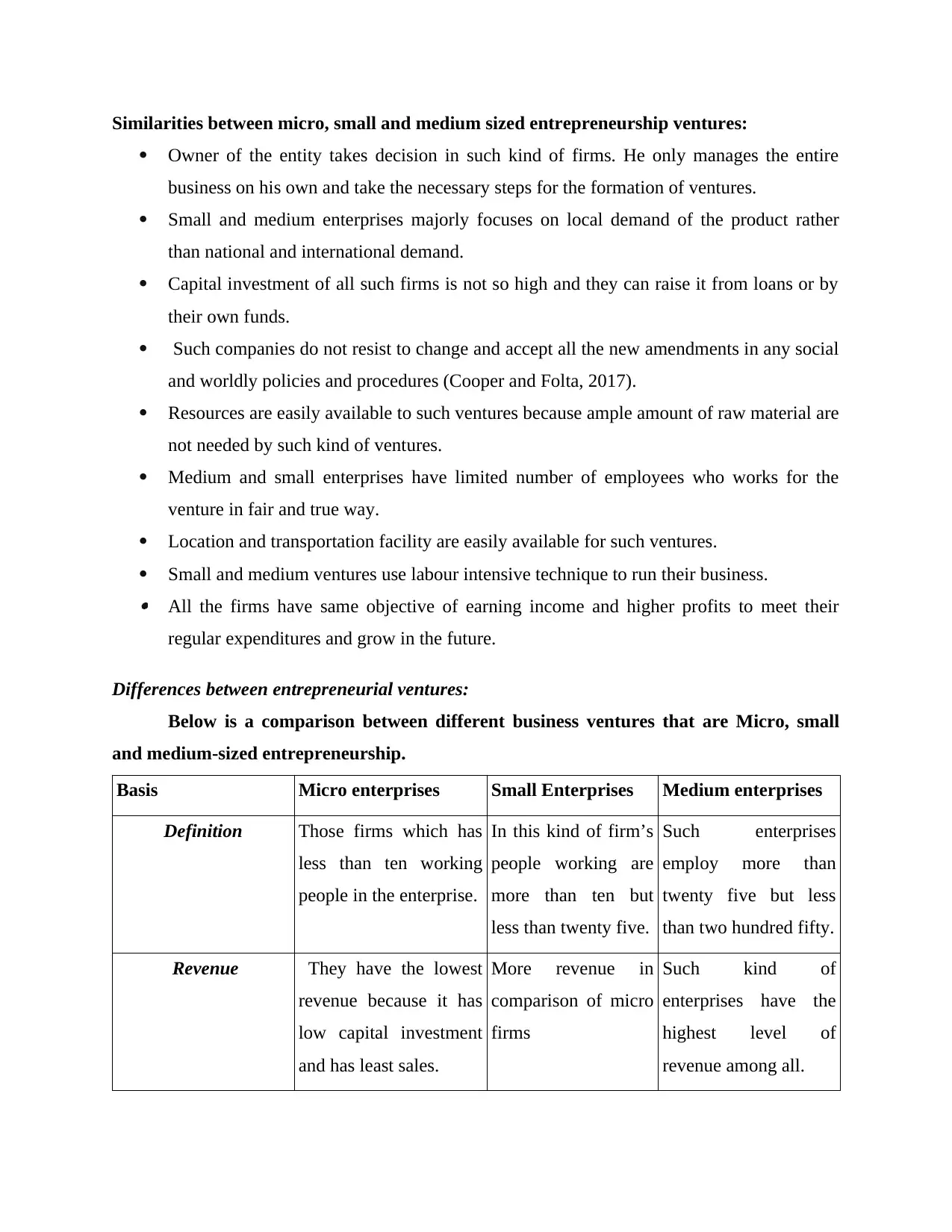
Similarities between micro, small and medium sized entrepreneurship ventures:
Owner of the entity takes decision in such kind of firms. He only manages the entire
business on his own and take the necessary steps for the formation of ventures.
Small and medium enterprises majorly focuses on local demand of the product rather
than national and international demand.
Capital investment of all such firms is not so high and they can raise it from loans or by
their own funds.
Such companies do not resist to change and accept all the new amendments in any social
and worldly policies and procedures (Cooper and Folta, 2017).
Resources are easily available to such ventures because ample amount of raw material are
not needed by such kind of ventures.
Medium and small enterprises have limited number of employees who works for the
venture in fair and true way.
Location and transportation facility are easily available for such ventures.
Small and medium ventures use labour intensive technique to run their business. All the firms have same objective of earning income and higher profits to meet their
regular expenditures and grow in the future.
Differences between entrepreneurial ventures:
Below is a comparison between different business ventures that are Micro, small
and medium-sized entrepreneurship.
Basis Micro enterprises Small Enterprises Medium enterprises
Definition Those firms which has
less than ten working
people in the enterprise.
In this kind of firm’s
people working are
more than ten but
less than twenty five.
Such enterprises
employ more than
twenty five but less
than two hundred fifty.
Revenue They have the lowest
revenue because it has
low capital investment
and has least sales.
More revenue in
comparison of micro
firms
Such kind of
enterprises have the
highest level of
revenue among all.
Owner of the entity takes decision in such kind of firms. He only manages the entire
business on his own and take the necessary steps for the formation of ventures.
Small and medium enterprises majorly focuses on local demand of the product rather
than national and international demand.
Capital investment of all such firms is not so high and they can raise it from loans or by
their own funds.
Such companies do not resist to change and accept all the new amendments in any social
and worldly policies and procedures (Cooper and Folta, 2017).
Resources are easily available to such ventures because ample amount of raw material are
not needed by such kind of ventures.
Medium and small enterprises have limited number of employees who works for the
venture in fair and true way.
Location and transportation facility are easily available for such ventures.
Small and medium ventures use labour intensive technique to run their business. All the firms have same objective of earning income and higher profits to meet their
regular expenditures and grow in the future.
Differences between entrepreneurial ventures:
Below is a comparison between different business ventures that are Micro, small
and medium-sized entrepreneurship.
Basis Micro enterprises Small Enterprises Medium enterprises
Definition Those firms which has
less than ten working
people in the enterprise.
In this kind of firm’s
people working are
more than ten but
less than twenty five.
Such enterprises
employ more than
twenty five but less
than two hundred fifty.
Revenue They have the lowest
revenue because it has
low capital investment
and has least sales.
More revenue in
comparison of micro
firms
Such kind of
enterprises have the
highest level of
revenue among all.
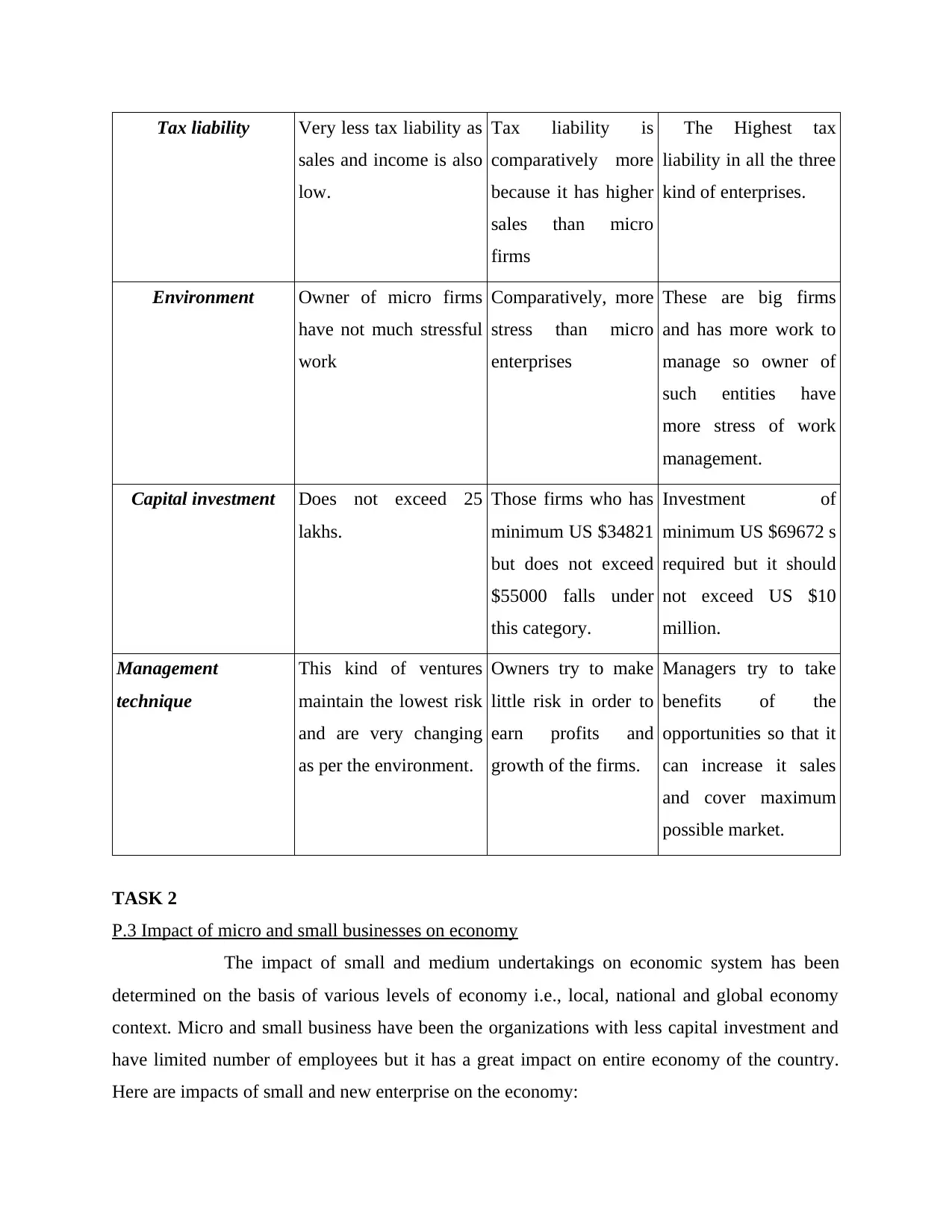
Tax liability Very less tax liability as
sales and income is also
low.
Tax liability is
comparatively more
because it has higher
sales than micro
firms
The Highest tax
liability in all the three
kind of enterprises.
Environment Owner of micro firms
have not much stressful
work
Comparatively, more
stress than micro
enterprises
These are big firms
and has more work to
manage so owner of
such entities have
more stress of work
management.
Capital investment Does not exceed 25
lakhs.
Those firms who has
minimum US $34821
but does not exceed
$55000 falls under
this category.
Investment of
minimum US $69672 s
required but it should
not exceed US $10
million.
Management
technique
This kind of ventures
maintain the lowest risk
and are very changing
as per the environment.
Owners try to make
little risk in order to
earn profits and
growth of the firms.
Managers try to take
benefits of the
opportunities so that it
can increase it sales
and cover maximum
possible market.
TASK 2
P.3 Impact of micro and small businesses on economy
The impact of small and medium undertakings on economic system has been
determined on the basis of various levels of economy i.e., local, national and global economy
context. Micro and small business have been the organizations with less capital investment and
have limited number of employees but it has a great impact on entire economy of the country.
Here are impacts of small and new enterprise on the economy:
sales and income is also
low.
Tax liability is
comparatively more
because it has higher
sales than micro
firms
The Highest tax
liability in all the three
kind of enterprises.
Environment Owner of micro firms
have not much stressful
work
Comparatively, more
stress than micro
enterprises
These are big firms
and has more work to
manage so owner of
such entities have
more stress of work
management.
Capital investment Does not exceed 25
lakhs.
Those firms who has
minimum US $34821
but does not exceed
$55000 falls under
this category.
Investment of
minimum US $69672 s
required but it should
not exceed US $10
million.
Management
technique
This kind of ventures
maintain the lowest risk
and are very changing
as per the environment.
Owners try to make
little risk in order to
earn profits and
growth of the firms.
Managers try to take
benefits of the
opportunities so that it
can increase it sales
and cover maximum
possible market.
TASK 2
P.3 Impact of micro and small businesses on economy
The impact of small and medium undertakings on economic system has been
determined on the basis of various levels of economy i.e., local, national and global economy
context. Micro and small business have been the organizations with less capital investment and
have limited number of employees but it has a great impact on entire economy of the country.
Here are impacts of small and new enterprise on the economy:
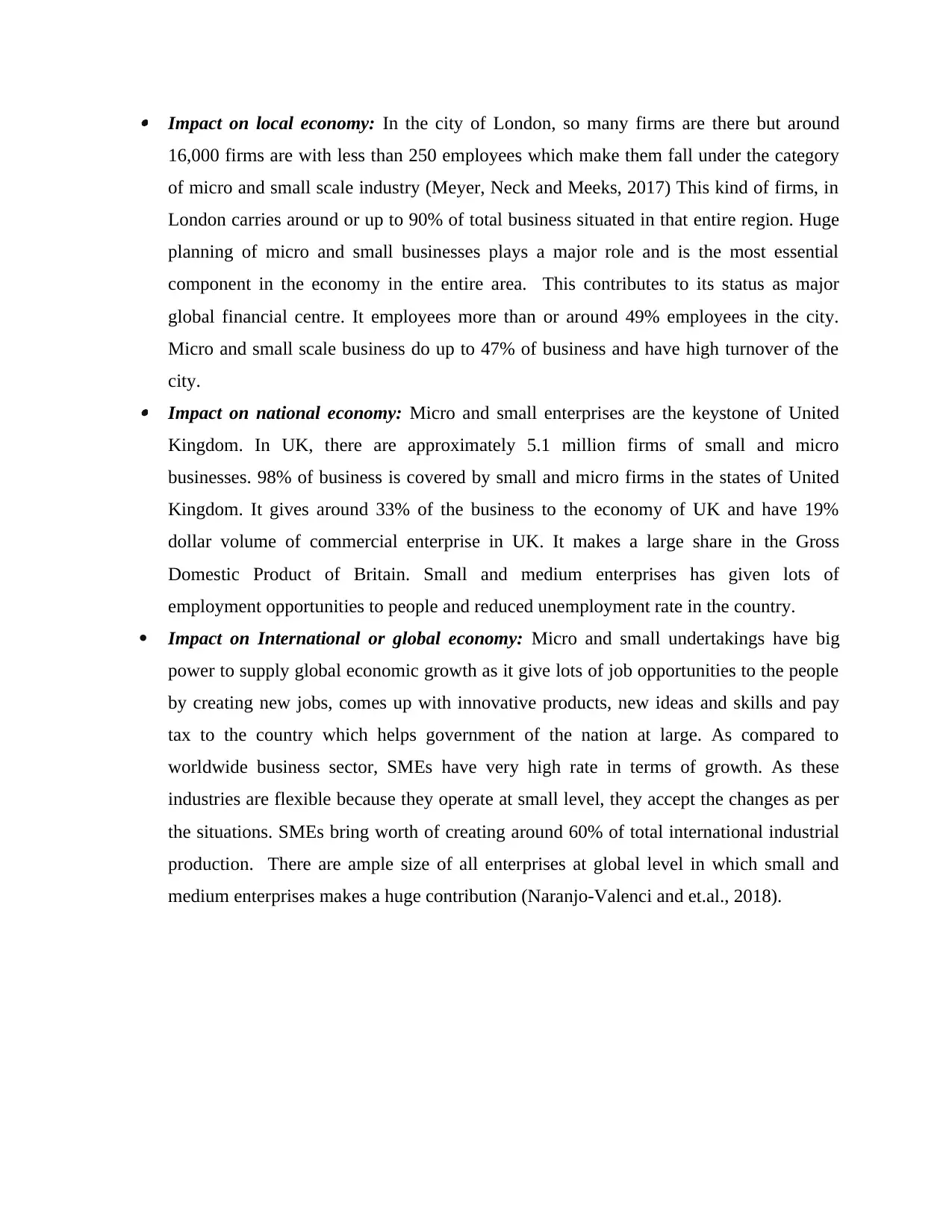
Impact on local economy: In the city of London, so many firms are there but around
16,000 firms are with less than 250 employees which make them fall under the category
of micro and small scale industry (Meyer, Neck and Meeks, 2017) This kind of firms, in
London carries around or up to 90% of total business situated in that entire region. Huge
planning of micro and small businesses plays a major role and is the most essential
component in the economy in the entire area. This contributes to its status as major
global financial centre. It employees more than or around 49% employees in the city.
Micro and small scale business do up to 47% of business and have high turnover of the
city. Impact on national economy: Micro and small enterprises are the keystone of United
Kingdom. In UK, there are approximately 5.1 million firms of small and micro
businesses. 98% of business is covered by small and micro firms in the states of United
Kingdom. It gives around 33% of the business to the economy of UK and have 19%
dollar volume of commercial enterprise in UK. It makes a large share in the Gross
Domestic Product of Britain. Small and medium enterprises has given lots of
employment opportunities to people and reduced unemployment rate in the country.
Impact on International or global economy: Micro and small undertakings have big
power to supply global economic growth as it give lots of job opportunities to the people
by creating new jobs, comes up with innovative products, new ideas and skills and pay
tax to the country which helps government of the nation at large. As compared to
worldwide business sector, SMEs have very high rate in terms of growth. As these
industries are flexible because they operate at small level, they accept the changes as per
the situations. SMEs bring worth of creating around 60% of total international industrial
production. There are ample size of all enterprises at global level in which small and
medium enterprises makes a huge contribution (Naranjo-Valenci and et.al., 2018).
16,000 firms are with less than 250 employees which make them fall under the category
of micro and small scale industry (Meyer, Neck and Meeks, 2017) This kind of firms, in
London carries around or up to 90% of total business situated in that entire region. Huge
planning of micro and small businesses plays a major role and is the most essential
component in the economy in the entire area. This contributes to its status as major
global financial centre. It employees more than or around 49% employees in the city.
Micro and small scale business do up to 47% of business and have high turnover of the
city. Impact on national economy: Micro and small enterprises are the keystone of United
Kingdom. In UK, there are approximately 5.1 million firms of small and micro
businesses. 98% of business is covered by small and micro firms in the states of United
Kingdom. It gives around 33% of the business to the economy of UK and have 19%
dollar volume of commercial enterprise in UK. It makes a large share in the Gross
Domestic Product of Britain. Small and medium enterprises has given lots of
employment opportunities to people and reduced unemployment rate in the country.
Impact on International or global economy: Micro and small undertakings have big
power to supply global economic growth as it give lots of job opportunities to the people
by creating new jobs, comes up with innovative products, new ideas and skills and pay
tax to the country which helps government of the nation at large. As compared to
worldwide business sector, SMEs have very high rate in terms of growth. As these
industries are flexible because they operate at small level, they accept the changes as per
the situations. SMEs bring worth of creating around 60% of total international industrial
production. There are ample size of all enterprises at global level in which small and
medium enterprises makes a huge contribution (Naranjo-Valenci and et.al., 2018).
Paraphrase This Document
Need a fresh take? Get an instant paraphrase of this document with our AI Paraphraser
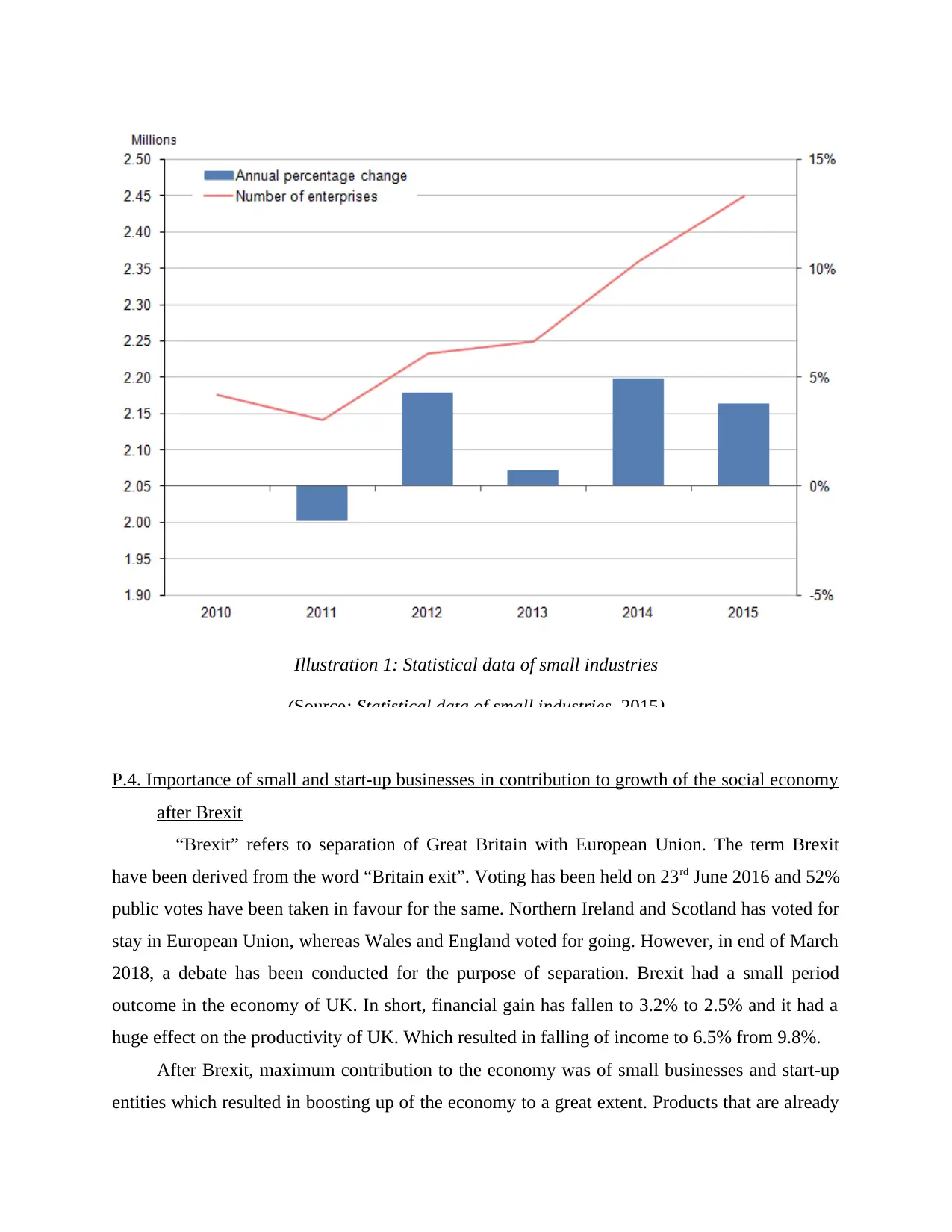
P.4. Importance of small and start-up businesses in contribution to growth of the social economy
after Brexit
“Brexit” refers to separation of Great Britain with European Union. The term Brexit
have been derived from the word “Britain exit”. Voting has been held on 23rd June 2016 and 52%
public votes have been taken in favour for the same. Northern Ireland and Scotland has voted for
stay in European Union, whereas Wales and England voted for going. However, in end of March
2018, a debate has been conducted for the purpose of separation. Brexit had a small period
outcome in the economy of UK. In short, financial gain has fallen to 3.2% to 2.5% and it had a
huge effect on the productivity of UK. Which resulted in falling of income to 6.5% from 9.8%.
After Brexit, maximum contribution to the economy was of small businesses and start-up
entities which resulted in boosting up of the economy to a great extent. Products that are already
Illustration 1: Statistical data of small industries
(Source: Statistical data of small industries, 2015)
after Brexit
“Brexit” refers to separation of Great Britain with European Union. The term Brexit
have been derived from the word “Britain exit”. Voting has been held on 23rd June 2016 and 52%
public votes have been taken in favour for the same. Northern Ireland and Scotland has voted for
stay in European Union, whereas Wales and England voted for going. However, in end of March
2018, a debate has been conducted for the purpose of separation. Brexit had a small period
outcome in the economy of UK. In short, financial gain has fallen to 3.2% to 2.5% and it had a
huge effect on the productivity of UK. Which resulted in falling of income to 6.5% from 9.8%.
After Brexit, maximum contribution to the economy was of small businesses and start-up
entities which resulted in boosting up of the economy to a great extent. Products that are already
Illustration 1: Statistical data of small industries
(Source: Statistical data of small industries, 2015)
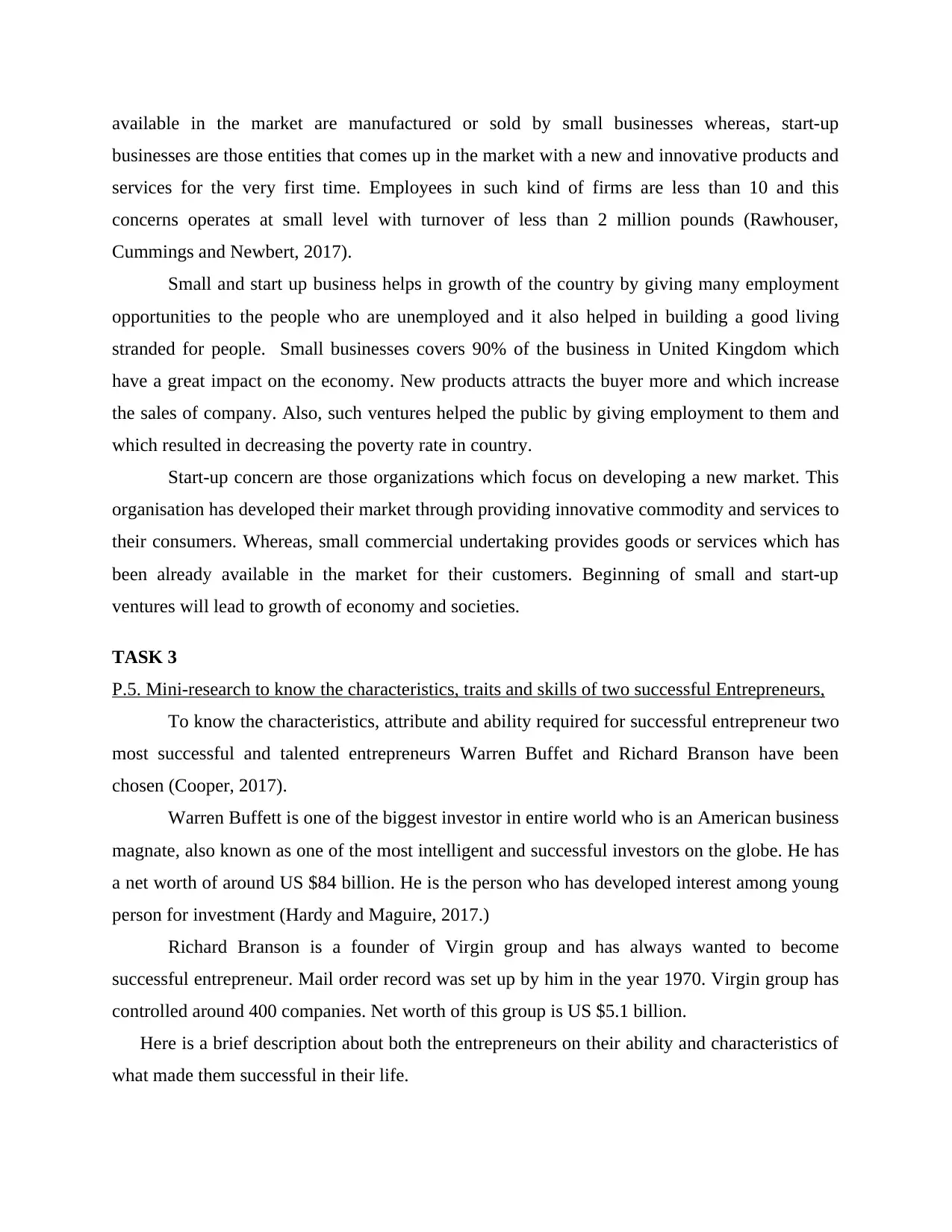
available in the market are manufactured or sold by small businesses whereas, start-up
businesses are those entities that comes up in the market with a new and innovative products and
services for the very first time. Employees in such kind of firms are less than 10 and this
concerns operates at small level with turnover of less than 2 million pounds (Rawhouser,
Cummings and Newbert, 2017).
Small and start up business helps in growth of the country by giving many employment
opportunities to the people who are unemployed and it also helped in building a good living
stranded for people. Small businesses covers 90% of the business in United Kingdom which
have a great impact on the economy. New products attracts the buyer more and which increase
the sales of company. Also, such ventures helped the public by giving employment to them and
which resulted in decreasing the poverty rate in country.
Start-up concern are those organizations which focus on developing a new market. This
organisation has developed their market through providing innovative commodity and services to
their consumers. Whereas, small commercial undertaking provides goods or services which has
been already available in the market for their customers. Beginning of small and start-up
ventures will lead to growth of economy and societies.
TASK 3
P.5. Mini-research to know the characteristics, traits and skills of two successful Entrepreneurs,
To know the characteristics, attribute and ability required for successful entrepreneur two
most successful and talented entrepreneurs Warren Buffet and Richard Branson have been
chosen (Cooper, 2017).
Warren Buffett is one of the biggest investor in entire world who is an American business
magnate, also known as one of the most intelligent and successful investors on the globe. He has
a net worth of around US $84 billion. He is the person who has developed interest among young
person for investment (Hardy and Maguire, 2017.)
Richard Branson is a founder of Virgin group and has always wanted to become
successful entrepreneur. Mail order record was set up by him in the year 1970. Virgin group has
controlled around 400 companies. Net worth of this group is US $5.1 billion.
Here is a brief description about both the entrepreneurs on their ability and characteristics of
what made them successful in their life.
businesses are those entities that comes up in the market with a new and innovative products and
services for the very first time. Employees in such kind of firms are less than 10 and this
concerns operates at small level with turnover of less than 2 million pounds (Rawhouser,
Cummings and Newbert, 2017).
Small and start up business helps in growth of the country by giving many employment
opportunities to the people who are unemployed and it also helped in building a good living
stranded for people. Small businesses covers 90% of the business in United Kingdom which
have a great impact on the economy. New products attracts the buyer more and which increase
the sales of company. Also, such ventures helped the public by giving employment to them and
which resulted in decreasing the poverty rate in country.
Start-up concern are those organizations which focus on developing a new market. This
organisation has developed their market through providing innovative commodity and services to
their consumers. Whereas, small commercial undertaking provides goods or services which has
been already available in the market for their customers. Beginning of small and start-up
ventures will lead to growth of economy and societies.
TASK 3
P.5. Mini-research to know the characteristics, traits and skills of two successful Entrepreneurs,
To know the characteristics, attribute and ability required for successful entrepreneur two
most successful and talented entrepreneurs Warren Buffet and Richard Branson have been
chosen (Cooper, 2017).
Warren Buffett is one of the biggest investor in entire world who is an American business
magnate, also known as one of the most intelligent and successful investors on the globe. He has
a net worth of around US $84 billion. He is the person who has developed interest among young
person for investment (Hardy and Maguire, 2017.)
Richard Branson is a founder of Virgin group and has always wanted to become
successful entrepreneur. Mail order record was set up by him in the year 1970. Virgin group has
controlled around 400 companies. Net worth of this group is US $5.1 billion.
Here is a brief description about both the entrepreneurs on their ability and characteristics of
what made them successful in their life.
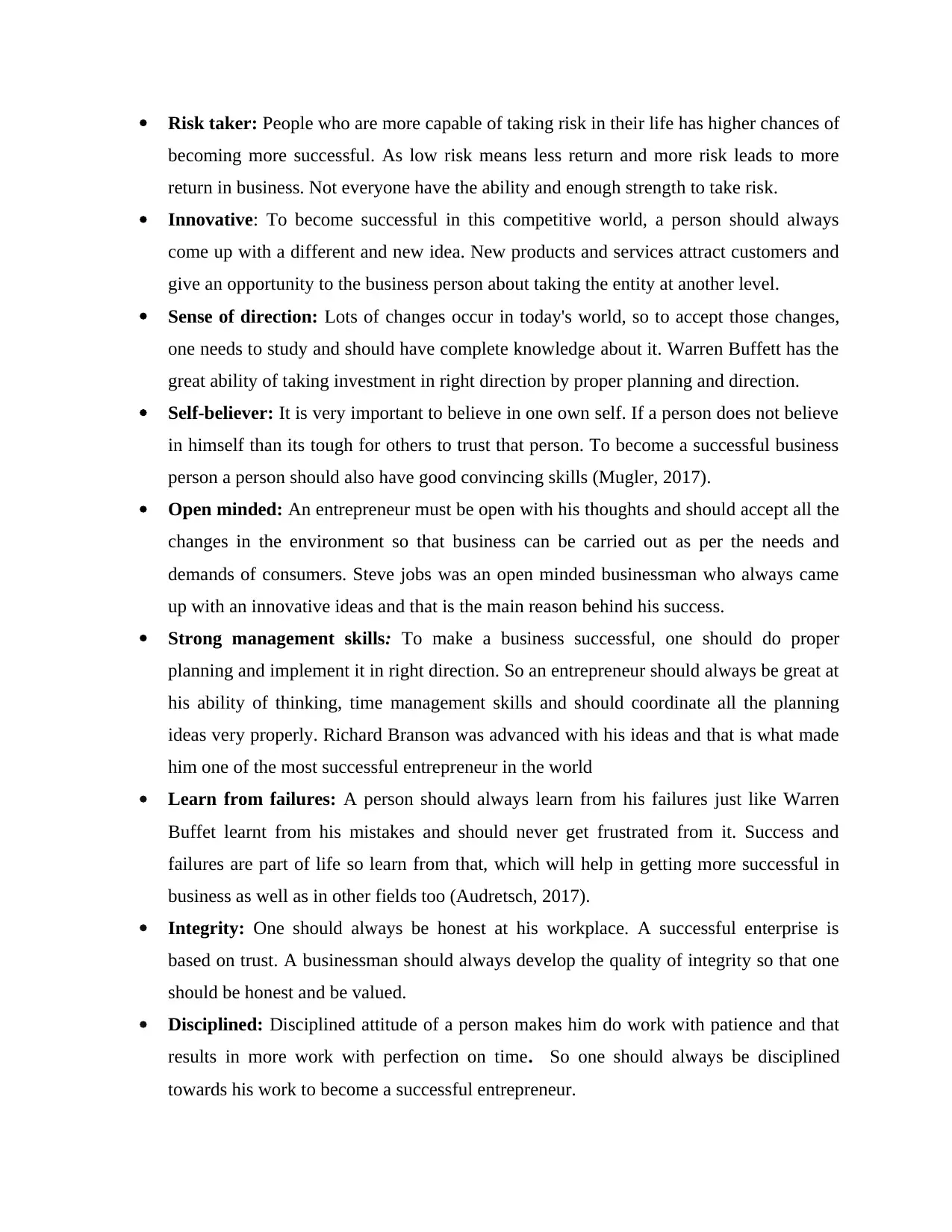
Risk taker: People who are more capable of taking risk in their life has higher chances of
becoming more successful. As low risk means less return and more risk leads to more
return in business. Not everyone have the ability and enough strength to take risk.
Innovative: To become successful in this competitive world, a person should always
come up with a different and new idea. New products and services attract customers and
give an opportunity to the business person about taking the entity at another level.
Sense of direction: Lots of changes occur in today's world, so to accept those changes,
one needs to study and should have complete knowledge about it. Warren Buffett has the
great ability of taking investment in right direction by proper planning and direction.
Self-believer: It is very important to believe in one own self. If a person does not believe
in himself than its tough for others to trust that person. To become a successful business
person a person should also have good convincing skills (Mugler, 2017).
Open minded: An entrepreneur must be open with his thoughts and should accept all the
changes in the environment so that business can be carried out as per the needs and
demands of consumers. Steve jobs was an open minded businessman who always came
up with an innovative ideas and that is the main reason behind his success.
Strong management skills: To make a business successful, one should do proper
planning and implement it in right direction. So an entrepreneur should always be great at
his ability of thinking, time management skills and should coordinate all the planning
ideas very properly. Richard Branson was advanced with his ideas and that is what made
him one of the most successful entrepreneur in the world
Learn from failures: A person should always learn from his failures just like Warren
Buffet learnt from his mistakes and should never get frustrated from it. Success and
failures are part of life so learn from that, which will help in getting more successful in
business as well as in other fields too (Audretsch, 2017).
Integrity: One should always be honest at his workplace. A successful enterprise is
based on trust. A businessman should always develop the quality of integrity so that one
should be honest and be valued.
Disciplined: Disciplined attitude of a person makes him do work with patience and that
results in more work with perfection on time. So one should always be disciplined
towards his work to become a successful entrepreneur.
becoming more successful. As low risk means less return and more risk leads to more
return in business. Not everyone have the ability and enough strength to take risk.
Innovative: To become successful in this competitive world, a person should always
come up with a different and new idea. New products and services attract customers and
give an opportunity to the business person about taking the entity at another level.
Sense of direction: Lots of changes occur in today's world, so to accept those changes,
one needs to study and should have complete knowledge about it. Warren Buffett has the
great ability of taking investment in right direction by proper planning and direction.
Self-believer: It is very important to believe in one own self. If a person does not believe
in himself than its tough for others to trust that person. To become a successful business
person a person should also have good convincing skills (Mugler, 2017).
Open minded: An entrepreneur must be open with his thoughts and should accept all the
changes in the environment so that business can be carried out as per the needs and
demands of consumers. Steve jobs was an open minded businessman who always came
up with an innovative ideas and that is the main reason behind his success.
Strong management skills: To make a business successful, one should do proper
planning and implement it in right direction. So an entrepreneur should always be great at
his ability of thinking, time management skills and should coordinate all the planning
ideas very properly. Richard Branson was advanced with his ideas and that is what made
him one of the most successful entrepreneur in the world
Learn from failures: A person should always learn from his failures just like Warren
Buffet learnt from his mistakes and should never get frustrated from it. Success and
failures are part of life so learn from that, which will help in getting more successful in
business as well as in other fields too (Audretsch, 2017).
Integrity: One should always be honest at his workplace. A successful enterprise is
based on trust. A businessman should always develop the quality of integrity so that one
should be honest and be valued.
Disciplined: Disciplined attitude of a person makes him do work with patience and that
results in more work with perfection on time. So one should always be disciplined
towards his work to become a successful entrepreneur.
Secure Best Marks with AI Grader
Need help grading? Try our AI Grader for instant feedback on your assignments.
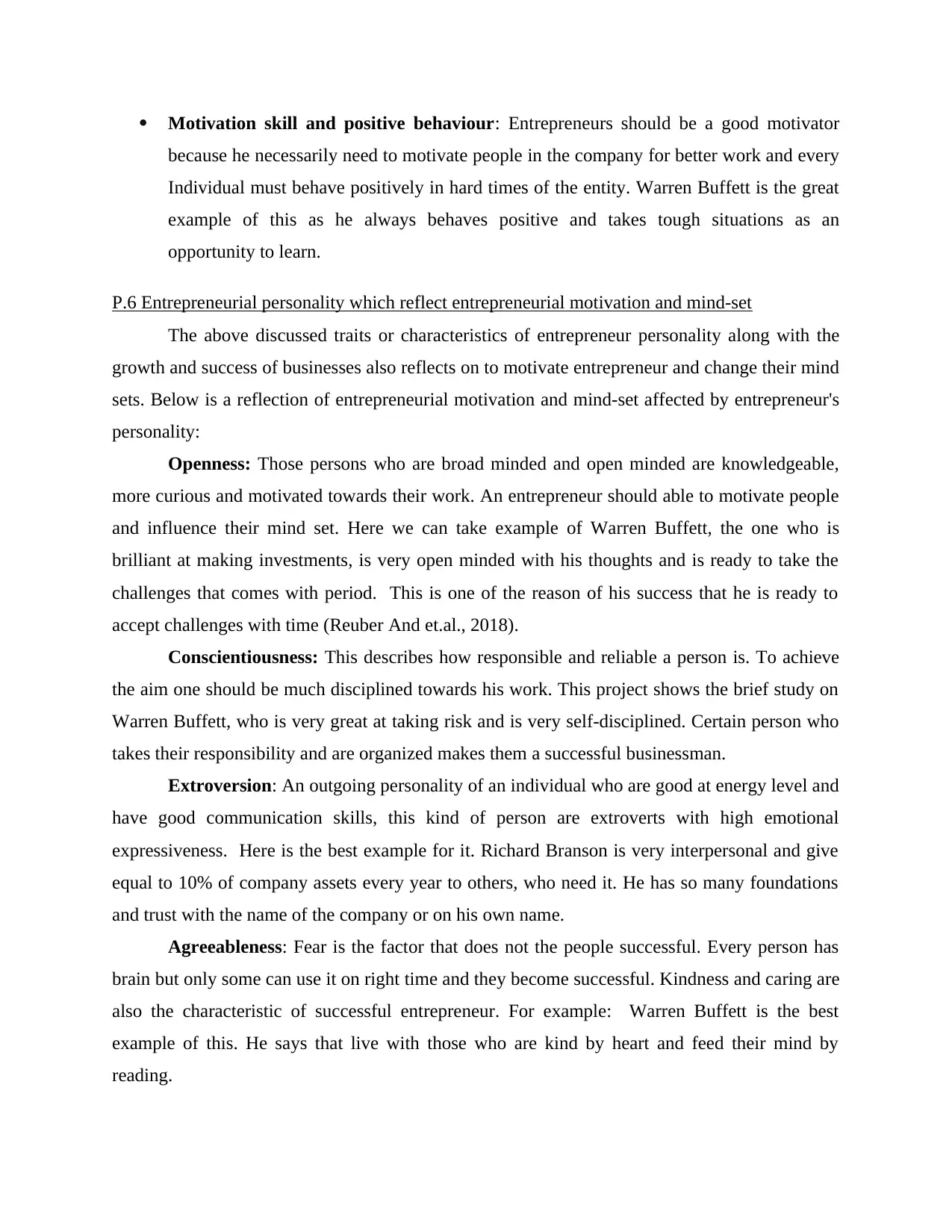
Motivation skill and positive behaviour: Entrepreneurs should be a good motivator
because he necessarily need to motivate people in the company for better work and every
Individual must behave positively in hard times of the entity. Warren Buffett is the great
example of this as he always behaves positive and takes tough situations as an
opportunity to learn.
P.6 Entrepreneurial personality which reflect entrepreneurial motivation and mind-set
The above discussed traits or characteristics of entrepreneur personality along with the
growth and success of businesses also reflects on to motivate entrepreneur and change their mind
sets. Below is a reflection of entrepreneurial motivation and mind-set affected by entrepreneur's
personality:
Openness: Those persons who are broad minded and open minded are knowledgeable,
more curious and motivated towards their work. An entrepreneur should able to motivate people
and influence their mind set. Here we can take example of Warren Buffett, the one who is
brilliant at making investments, is very open minded with his thoughts and is ready to take the
challenges that comes with period. This is one of the reason of his success that he is ready to
accept challenges with time (Reuber And et.al., 2018).
Conscientiousness: This describes how responsible and reliable a person is. To achieve
the aim one should be much disciplined towards his work. This project shows the brief study on
Warren Buffett, who is very great at taking risk and is very self-disciplined. Certain person who
takes their responsibility and are organized makes them a successful businessman.
Extroversion: An outgoing personality of an individual who are good at energy level and
have good communication skills, this kind of person are extroverts with high emotional
expressiveness. Here is the best example for it. Richard Branson is very interpersonal and give
equal to 10% of company assets every year to others, who need it. He has so many foundations
and trust with the name of the company or on his own name.
Agreeableness: Fear is the factor that does not the people successful. Every person has
brain but only some can use it on right time and they become successful. Kindness and caring are
also the characteristic of successful entrepreneur. For example: Warren Buffett is the best
example of this. He says that live with those who are kind by heart and feed their mind by
reading.
because he necessarily need to motivate people in the company for better work and every
Individual must behave positively in hard times of the entity. Warren Buffett is the great
example of this as he always behaves positive and takes tough situations as an
opportunity to learn.
P.6 Entrepreneurial personality which reflect entrepreneurial motivation and mind-set
The above discussed traits or characteristics of entrepreneur personality along with the
growth and success of businesses also reflects on to motivate entrepreneur and change their mind
sets. Below is a reflection of entrepreneurial motivation and mind-set affected by entrepreneur's
personality:
Openness: Those persons who are broad minded and open minded are knowledgeable,
more curious and motivated towards their work. An entrepreneur should able to motivate people
and influence their mind set. Here we can take example of Warren Buffett, the one who is
brilliant at making investments, is very open minded with his thoughts and is ready to take the
challenges that comes with period. This is one of the reason of his success that he is ready to
accept challenges with time (Reuber And et.al., 2018).
Conscientiousness: This describes how responsible and reliable a person is. To achieve
the aim one should be much disciplined towards his work. This project shows the brief study on
Warren Buffett, who is very great at taking risk and is very self-disciplined. Certain person who
takes their responsibility and are organized makes them a successful businessman.
Extroversion: An outgoing personality of an individual who are good at energy level and
have good communication skills, this kind of person are extroverts with high emotional
expressiveness. Here is the best example for it. Richard Branson is very interpersonal and give
equal to 10% of company assets every year to others, who need it. He has so many foundations
and trust with the name of the company or on his own name.
Agreeableness: Fear is the factor that does not the people successful. Every person has
brain but only some can use it on right time and they become successful. Kindness and caring are
also the characteristic of successful entrepreneur. For example: Warren Buffett is the best
example of this. He says that live with those who are kind by heart and feed their mind by
reading.
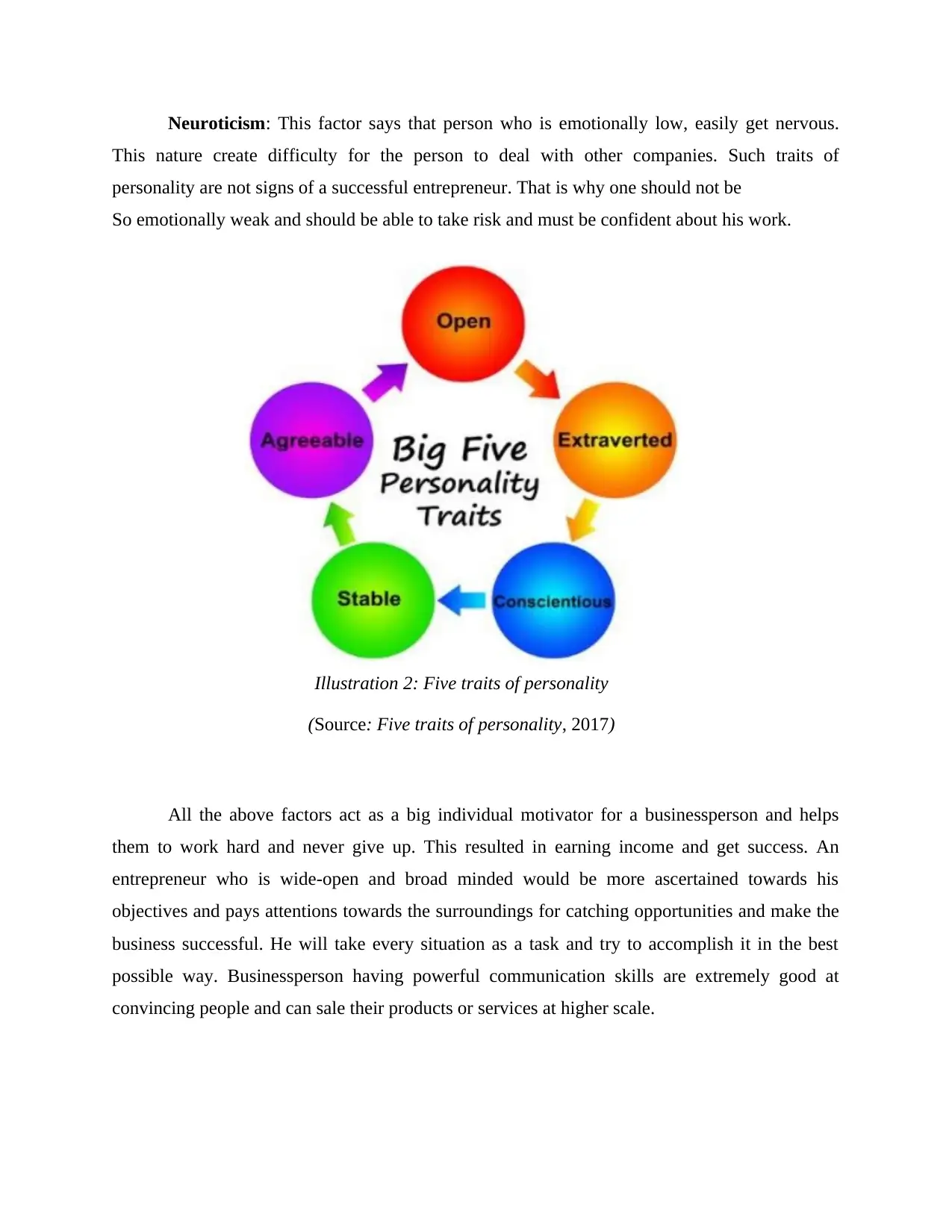
Neuroticism: This factor says that person who is emotionally low, easily get nervous.
This nature create difficulty for the person to deal with other companies. Such traits of
personality are not signs of a successful entrepreneur. That is why one should not be
So emotionally weak and should be able to take risk and must be confident about his work.
All the above factors act as a big individual motivator for a businessperson and helps
them to work hard and never give up. This resulted in earning income and get success. An
entrepreneur who is wide-open and broad minded would be more ascertained towards his
objectives and pays attentions towards the surroundings for catching opportunities and make the
business successful. He will take every situation as a task and try to accomplish it in the best
possible way. Businessperson having powerful communication skills are extremely good at
convincing people and can sale their products or services at higher scale.
Illustration 2: Five traits of personality
(Source: Five traits of personality, 2017)
This nature create difficulty for the person to deal with other companies. Such traits of
personality are not signs of a successful entrepreneur. That is why one should not be
So emotionally weak and should be able to take risk and must be confident about his work.
All the above factors act as a big individual motivator for a businessperson and helps
them to work hard and never give up. This resulted in earning income and get success. An
entrepreneur who is wide-open and broad minded would be more ascertained towards his
objectives and pays attentions towards the surroundings for catching opportunities and make the
business successful. He will take every situation as a task and try to accomplish it in the best
possible way. Businessperson having powerful communication skills are extremely good at
convincing people and can sale their products or services at higher scale.
Illustration 2: Five traits of personality
(Source: Five traits of personality, 2017)
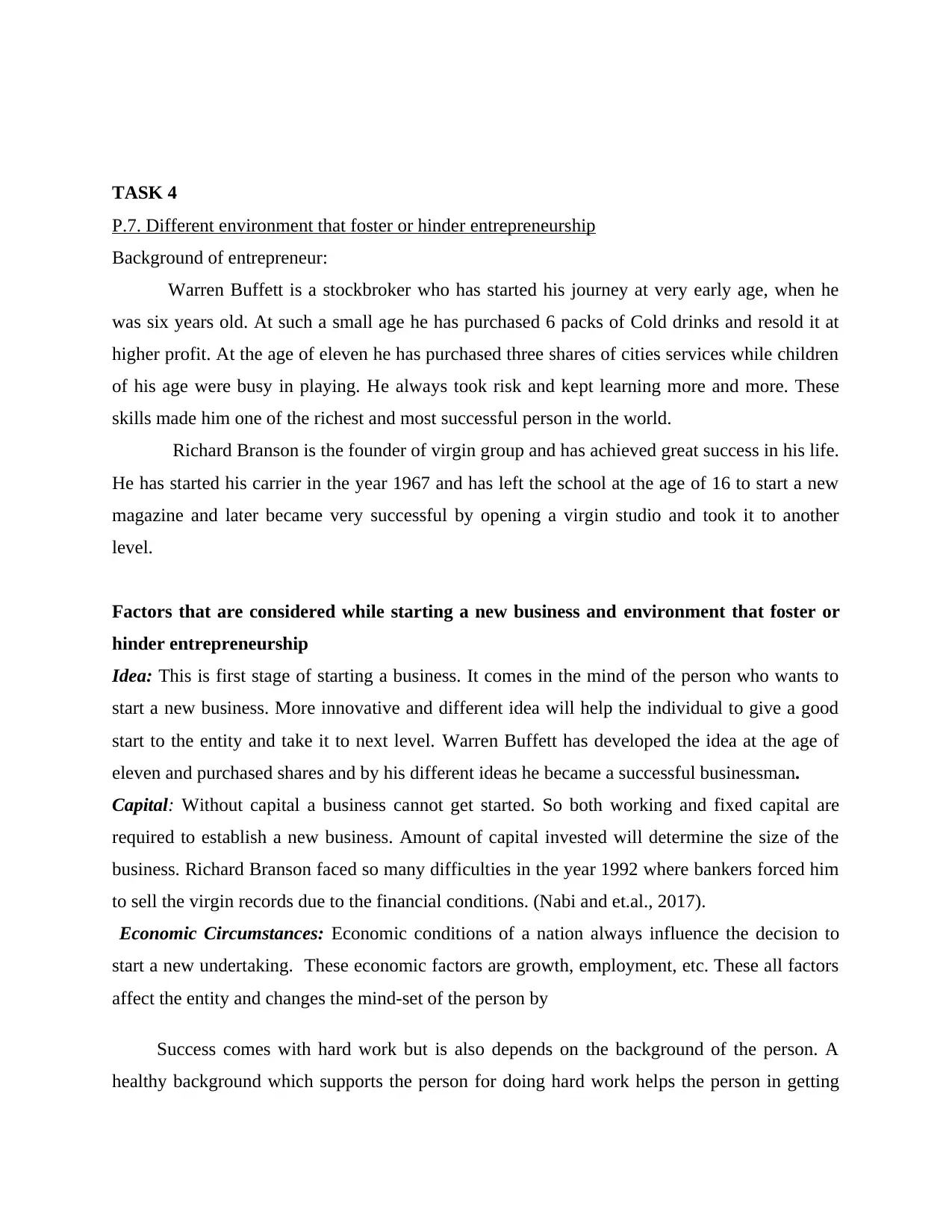
TASK 4
P.7. Different environment that foster or hinder entrepreneurship
Background of entrepreneur:
Warren Buffett is a stockbroker who has started his journey at very early age, when he
was six years old. At such a small age he has purchased 6 packs of Cold drinks and resold it at
higher profit. At the age of eleven he has purchased three shares of cities services while children
of his age were busy in playing. He always took risk and kept learning more and more. These
skills made him one of the richest and most successful person in the world.
Richard Branson is the founder of virgin group and has achieved great success in his life.
He has started his carrier in the year 1967 and has left the school at the age of 16 to start a new
magazine and later became very successful by opening a virgin studio and took it to another
level.
Factors that are considered while starting a new business and environment that foster or
hinder entrepreneurship
Idea: This is first stage of starting a business. It comes in the mind of the person who wants to
start a new business. More innovative and different idea will help the individual to give a good
start to the entity and take it to next level. Warren Buffett has developed the idea at the age of
eleven and purchased shares and by his different ideas he became a successful businessman.
Capital: Without capital a business cannot get started. So both working and fixed capital are
required to establish a new business. Amount of capital invested will determine the size of the
business. Richard Branson faced so many difficulties in the year 1992 where bankers forced him
to sell the virgin records due to the financial conditions. (Nabi and et.al., 2017).
Economic Circumstances: Economic conditions of a nation always influence the decision to
start a new undertaking. These economic factors are growth, employment, etc. These all factors
affect the entity and changes the mind-set of the person by
Success comes with hard work but is also depends on the background of the person. A
healthy background which supports the person for doing hard work helps the person in getting
P.7. Different environment that foster or hinder entrepreneurship
Background of entrepreneur:
Warren Buffett is a stockbroker who has started his journey at very early age, when he
was six years old. At such a small age he has purchased 6 packs of Cold drinks and resold it at
higher profit. At the age of eleven he has purchased three shares of cities services while children
of his age were busy in playing. He always took risk and kept learning more and more. These
skills made him one of the richest and most successful person in the world.
Richard Branson is the founder of virgin group and has achieved great success in his life.
He has started his carrier in the year 1967 and has left the school at the age of 16 to start a new
magazine and later became very successful by opening a virgin studio and took it to another
level.
Factors that are considered while starting a new business and environment that foster or
hinder entrepreneurship
Idea: This is first stage of starting a business. It comes in the mind of the person who wants to
start a new business. More innovative and different idea will help the individual to give a good
start to the entity and take it to next level. Warren Buffett has developed the idea at the age of
eleven and purchased shares and by his different ideas he became a successful businessman.
Capital: Without capital a business cannot get started. So both working and fixed capital are
required to establish a new business. Amount of capital invested will determine the size of the
business. Richard Branson faced so many difficulties in the year 1992 where bankers forced him
to sell the virgin records due to the financial conditions. (Nabi and et.al., 2017).
Economic Circumstances: Economic conditions of a nation always influence the decision to
start a new undertaking. These economic factors are growth, employment, etc. These all factors
affect the entity and changes the mind-set of the person by
Success comes with hard work but is also depends on the background of the person. A
healthy background which supports the person for doing hard work helps the person in getting
Paraphrase This Document
Need a fresh take? Get an instant paraphrase of this document with our AI Paraphraser
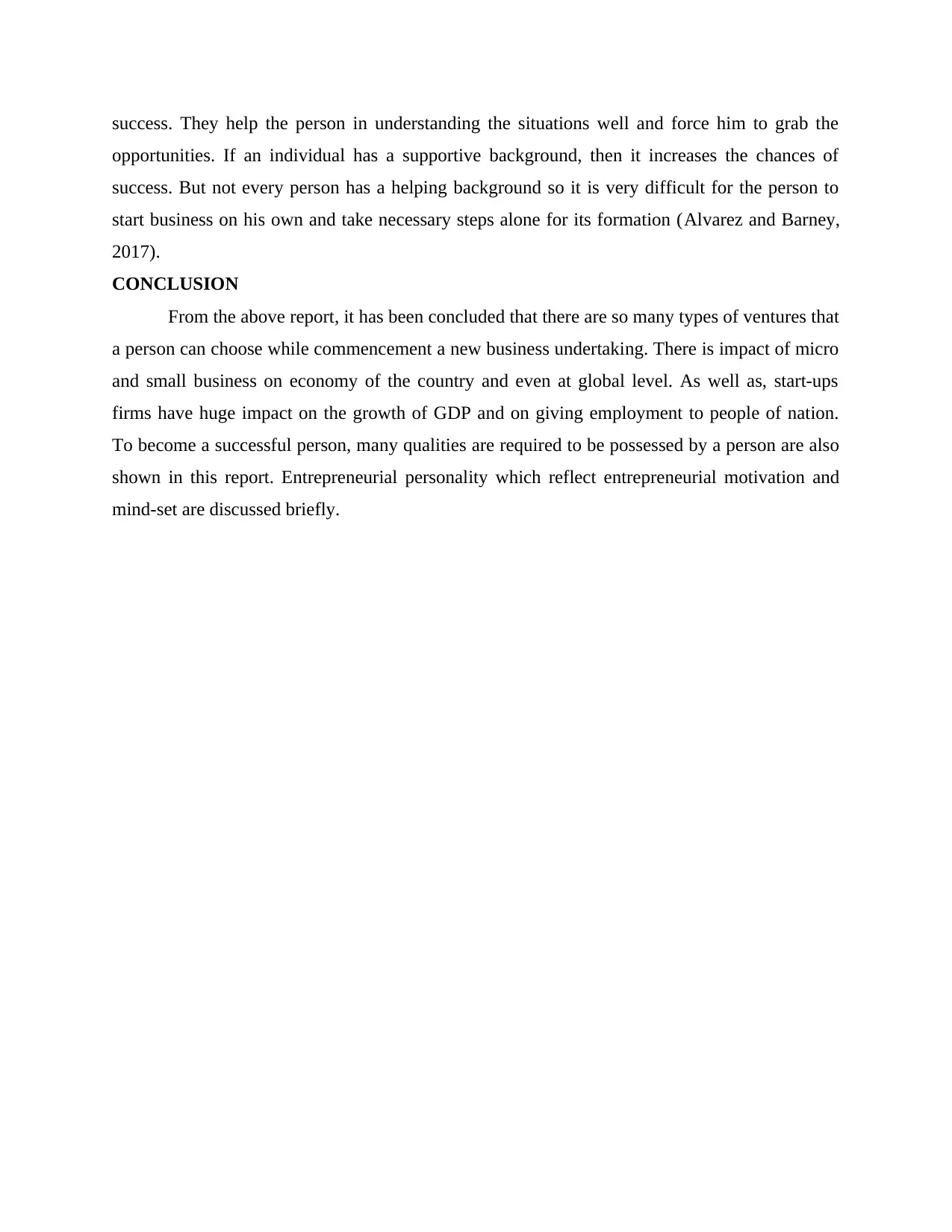
success. They help the person in understanding the situations well and force him to grab the
opportunities. If an individual has a supportive background, then it increases the chances of
success. But not every person has a helping background so it is very difficult for the person to
start business on his own and take necessary steps alone for its formation (Alvarez and Barney,
2017).
CONCLUSION
From the above report, it has been concluded that there are so many types of ventures that
a person can choose while commencement a new business undertaking. There is impact of micro
and small business on economy of the country and even at global level. As well as, start-ups
firms have huge impact on the growth of GDP and on giving employment to people of nation.
To become a successful person, many qualities are required to be possessed by a person are also
shown in this report. Entrepreneurial personality which reflect entrepreneurial motivation and
mind-set are discussed briefly.
opportunities. If an individual has a supportive background, then it increases the chances of
success. But not every person has a helping background so it is very difficult for the person to
start business on his own and take necessary steps alone for its formation (Alvarez and Barney,
2017).
CONCLUSION
From the above report, it has been concluded that there are so many types of ventures that
a person can choose while commencement a new business undertaking. There is impact of micro
and small business on economy of the country and even at global level. As well as, start-ups
firms have huge impact on the growth of GDP and on giving employment to people of nation.
To become a successful person, many qualities are required to be possessed by a person are also
shown in this report. Entrepreneurial personality which reflect entrepreneurial motivation and
mind-set are discussed briefly.
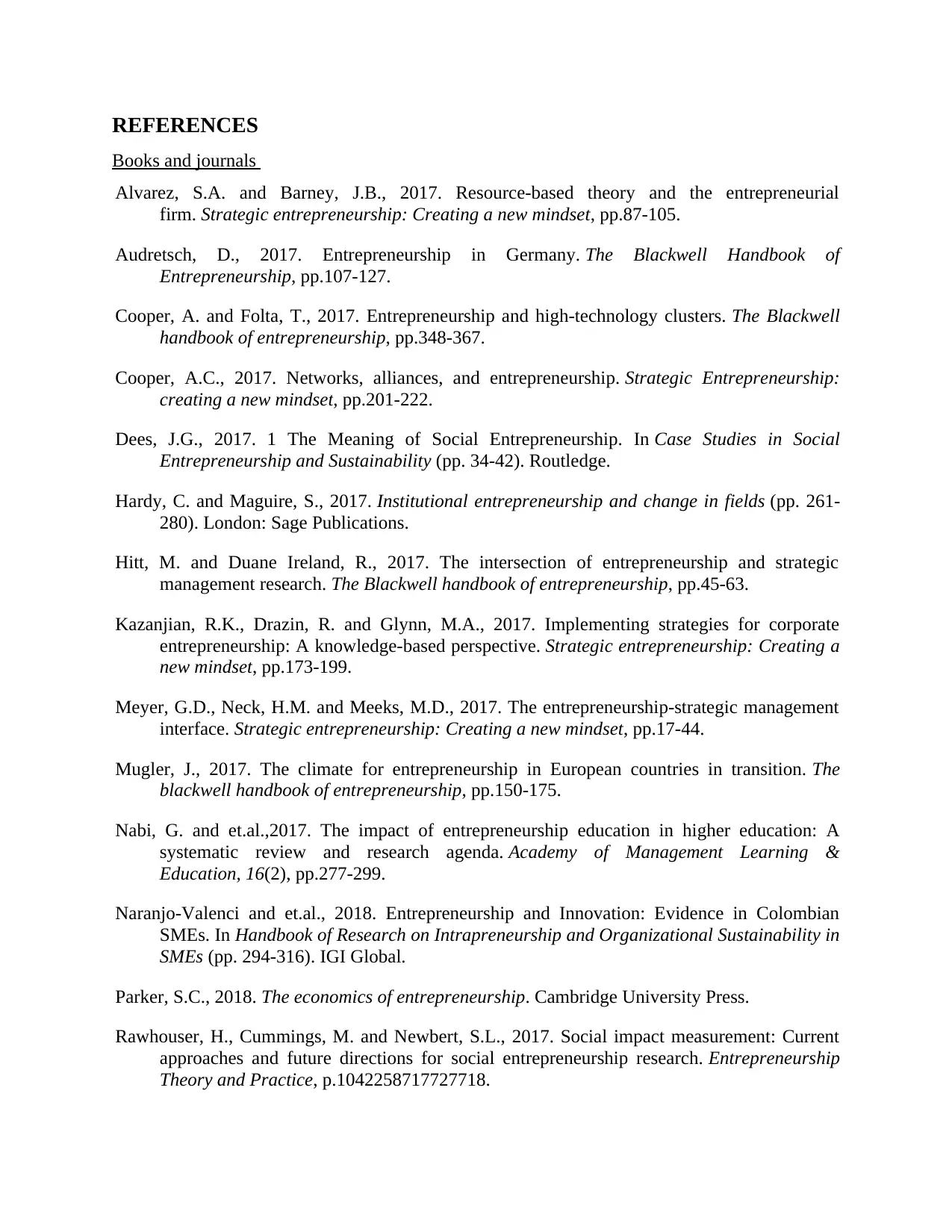
REFERENCES
Books and journals
Alvarez, S.A. and Barney, J.B., 2017. Resource‐based theory and the entrepreneurial
firm. Strategic entrepreneurship: Creating a new mindset, pp.87-105.
Audretsch, D., 2017. Entrepreneurship in Germany. The Blackwell Handbook of
Entrepreneurship, pp.107-127.
Cooper, A. and Folta, T., 2017. Entrepreneurship and high‐technology clusters. The Blackwell
handbook of entrepreneurship, pp.348-367.
Cooper, A.C., 2017. Networks, alliances, and entrepreneurship. Strategic Entrepreneurship:
creating a new mindset, pp.201-222.
Dees, J.G., 2017. 1 The Meaning of Social Entrepreneurship. In Case Studies in Social
Entrepreneurship and Sustainability (pp. 34-42). Routledge.
Hardy, C. and Maguire, S., 2017. Institutional entrepreneurship and change in fields (pp. 261-
280). London: Sage Publications.
Hitt, M. and Duane Ireland, R., 2017. The intersection of entrepreneurship and strategic
management research. The Blackwell handbook of entrepreneurship, pp.45-63.
Kazanjian, R.K., Drazin, R. and Glynn, M.A., 2017. Implementing strategies for corporate
entrepreneurship: A knowledge‐based perspective. Strategic entrepreneurship: Creating a
new mindset, pp.173-199.
Meyer, G.D., Neck, H.M. and Meeks, M.D., 2017. The entrepreneurship‐strategic management
interface. Strategic entrepreneurship: Creating a new mindset, pp.17-44.
Mugler, J., 2017. The climate for entrepreneurship in European countries in transition. The
blackwell handbook of entrepreneurship, pp.150-175.
Nabi, G. and et.al.,2017. The impact of entrepreneurship education in higher education: A
systematic review and research agenda. Academy of Management Learning &
Education, 16(2), pp.277-299.
Naranjo-Valenci and et.al., 2018. Entrepreneurship and Innovation: Evidence in Colombian
SMEs. In Handbook of Research on Intrapreneurship and Organizational Sustainability in
SMEs (pp. 294-316). IGI Global.
Parker, S.C., 2018. The economics of entrepreneurship. Cambridge University Press.
Rawhouser, H., Cummings, M. and Newbert, S.L., 2017. Social impact measurement: Current
approaches and future directions for social entrepreneurship research. Entrepreneurship
Theory and Practice, p.1042258717727718.
Books and journals
Alvarez, S.A. and Barney, J.B., 2017. Resource‐based theory and the entrepreneurial
firm. Strategic entrepreneurship: Creating a new mindset, pp.87-105.
Audretsch, D., 2017. Entrepreneurship in Germany. The Blackwell Handbook of
Entrepreneurship, pp.107-127.
Cooper, A. and Folta, T., 2017. Entrepreneurship and high‐technology clusters. The Blackwell
handbook of entrepreneurship, pp.348-367.
Cooper, A.C., 2017. Networks, alliances, and entrepreneurship. Strategic Entrepreneurship:
creating a new mindset, pp.201-222.
Dees, J.G., 2017. 1 The Meaning of Social Entrepreneurship. In Case Studies in Social
Entrepreneurship and Sustainability (pp. 34-42). Routledge.
Hardy, C. and Maguire, S., 2017. Institutional entrepreneurship and change in fields (pp. 261-
280). London: Sage Publications.
Hitt, M. and Duane Ireland, R., 2017. The intersection of entrepreneurship and strategic
management research. The Blackwell handbook of entrepreneurship, pp.45-63.
Kazanjian, R.K., Drazin, R. and Glynn, M.A., 2017. Implementing strategies for corporate
entrepreneurship: A knowledge‐based perspective. Strategic entrepreneurship: Creating a
new mindset, pp.173-199.
Meyer, G.D., Neck, H.M. and Meeks, M.D., 2017. The entrepreneurship‐strategic management
interface. Strategic entrepreneurship: Creating a new mindset, pp.17-44.
Mugler, J., 2017. The climate for entrepreneurship in European countries in transition. The
blackwell handbook of entrepreneurship, pp.150-175.
Nabi, G. and et.al.,2017. The impact of entrepreneurship education in higher education: A
systematic review and research agenda. Academy of Management Learning &
Education, 16(2), pp.277-299.
Naranjo-Valenci and et.al., 2018. Entrepreneurship and Innovation: Evidence in Colombian
SMEs. In Handbook of Research on Intrapreneurship and Organizational Sustainability in
SMEs (pp. 294-316). IGI Global.
Parker, S.C., 2018. The economics of entrepreneurship. Cambridge University Press.
Rawhouser, H., Cummings, M. and Newbert, S.L., 2017. Social impact measurement: Current
approaches and future directions for social entrepreneurship research. Entrepreneurship
Theory and Practice, p.1042258717727718.
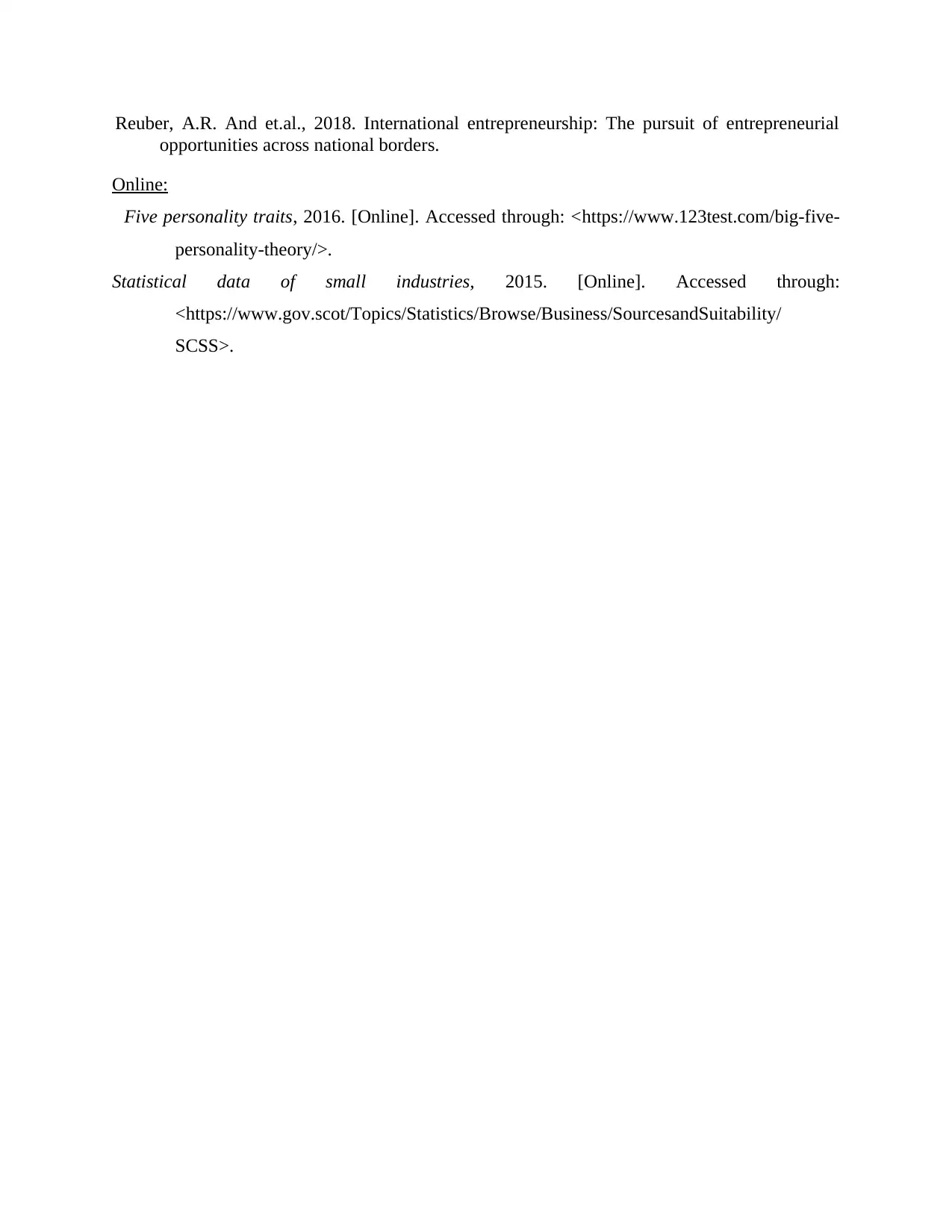
Reuber, A.R. And et.al., 2018. International entrepreneurship: The pursuit of entrepreneurial
opportunities across national borders.
Online:
Five personality traits, 2016. [Online]. Accessed through: <https://www.123test.com/big-five-
personality-theory/>.
Statistical data of small industries, 2015. [Online]. Accessed through:
<https://www.gov.scot/Topics/Statistics/Browse/Business/SourcesandSuitability/
SCSS>.
opportunities across national borders.
Online:
Five personality traits, 2016. [Online]. Accessed through: <https://www.123test.com/big-five-
personality-theory/>.
Statistical data of small industries, 2015. [Online]. Accessed through:
<https://www.gov.scot/Topics/Statistics/Browse/Business/SourcesandSuitability/
SCSS>.
1 out of 16
Related Documents
Your All-in-One AI-Powered Toolkit for Academic Success.
+13062052269
info@desklib.com
Available 24*7 on WhatsApp / Email
![[object Object]](/_next/static/media/star-bottom.7253800d.svg)
Unlock your academic potential
© 2024 | Zucol Services PVT LTD | All rights reserved.





